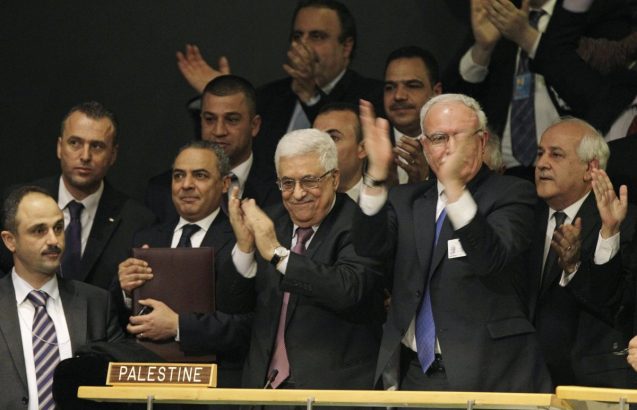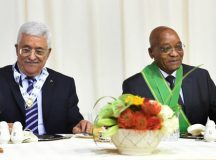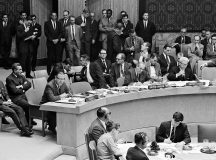Alex Ryvchin is the Co-Chief Executive Officer of the Executive Council of Australian Jewry and a member of the World Jewish Congress Jewish Diplomatic Corps. He is in New York as part of the Corps for the new session of the UN General Assembly that opens on 13 September.
The United Nations and various member states are poised to revisit the question of Palestine with renewed vigour. This invariably means flushing more money into UNRWA, a special agency devoted to keeping Palestinians in refugee camps in preparation for their long foretold conquest of Israel, and by again upgrading the Palestinian status, recognising them as a state despite virtual consensus, even among sympathisers, that they in no way meet the legal definition.
The United Nations’ handling of the issue is a story of mostly good ideals, good intentions and good people slowly asphyxiating under a mass of committees, rapporteurs, commissions of inquiry, urgent sessions and special reports. It is an example par excellence of how institutions formed to do something noble can cave in on themselves through the hypocrisy and malice of a few.
This issue is not a mere curiosity. It goes to the heart of how states engage in matters of peace and security, and how the budgets harvested from the incomes of our working populations are spent.
The United Nations first came to examine the question of Palestine in 1947. The British had been appointed trustees of the territory in 1922 pursuant to the ‘mandatory’ system, under which the victorious allies would take responsibility for the former Ottoman colonies ‘until such time as their native peoples could stand on their own.’ Britain got Palestine, severed it in two in 1922 and created Transjordan (now Jordan) in eastern Palestine the following year. The remaining piece of land between the River Jordan and the Mediterranean Sea had been, under international law, designated for the Jews, who as Winston Churchill noted had been ‘intimately and profoundly associated with Palestine for over 3,000 years.’
British governments came and went, Hitler rose to power, the Arabs in Palestine began to revolt, partitions of what remained of Palestine were recommended and swiftly rejected by the Arab side, the Holocaust began, Jews sought passage to Palestine, more revolts. The long and the short of it is that the British were challenged in attempting to deliver on their legal obligations of a Jewish state and keep the peace.
The British found one side that was willing to compromise, accept less, and upbuild their state in fact, not merely proclaim it in name. They found the other side obstinate to a fault, absolutely consistent in rejecting any notion of conciliation or coexistence, standing their ground doggedly and pulling out all means to thwart their opponents, while building precisely nothing.
In response to this, Neville Chamberlain told his cabinet, ‘If we must offend one side, let us offend the Jews rather than the Arabs.’ Indeed. Why not offend the side that had shown itself to be more accepting of disappointment, the numerically smaller side that hardly mattered in the grander scheme of world affairs just as World War was descending?
After the War and after the near annihilation of those Jews who remained in Europe, Britain surrendered its trusteeship and turned the matter over to the United Nations for speedy resolution. The UN formed a committee, as it tends to do, which seriously examined the issue and the way forward and reported that ‘regardless of the historical origins of the conflict, the rights and wrongs, there are two peoples in the land who are dissimilar in their ways of living and separated by political interests. Only by means of partition can these conflicting national aspirations find substantial expression and qualify both peoples to take their places as independent nations.’ Correct again.
The upshot of this was Israel’s declaration of independence on 14 May, 1948 and its acceptance as a full member of the United Nations the following year. This was despite the promise of hell to pay from the Arab world and the invasion of Israel by six Arab armies leading to mass displacement and fresh trauma for a nation of kibbutzniks and survivors.
In the 74 years that have followed, Israel has continued to upbuild, absorb millions of refugees from Africa, the Middle East and the former Soviet Union, has forged peace with old belligerents like Egypt and Jordan and more recently, Morocco, the UAE, Bahrain, Oman and Sudan. The Arabs in Palestine, now the Palestinians, have for the most part remained unchanged through those years, still viewing their struggle as one against European colonisers and not the ancient custodians of the land, and believing that if they resist long enough, the arc will bend in their favour and the Jews will eventually go some place else.
The international community, particularly the United Nations has been unwavering in its approach too. If the UN must offend one side, let it be the side with one country and one vote in the General Assembly rather than the side backed by entire regions and a murderers row of despots and failing states ranging from North Korea to Venezuela.
The United Nations granted the Palestinians observer status in 1974 to elevate their cause and give them the stage. The next year they forced through a resolution that deemed the Jewish emancipation movement that created Israel, Zionism, to be a form of racism. No Palestinians were aided by this resolution of course but Jewish students on campus still get assaulted with it. In 2012, the United Nations, upgraded the Palestinians status to non-member observer state calculating that it would encourage the Palestinians to negotiate an end to the conflict and achieve that final step of becoming an actual state and a full member of the UN.
In the decade that has followed, we have seen the question of Palestine remain as a permanent agenda item for the Human Rights Council, the only country-specific item. Commissions of Inquiry have been convened and Special Rapporteurs appointed, invariably led by those with records of hardened opposition to Israel, ranging from supporting the boycott movement against it to spouting full-blown antisemitic conspiracy theories. UNRWA continues to receive $1.6 billion a year. The UN marks an annual day of solidarity with the Palestinians, 29 November, which in an act of supreme irony is the date the United Nations endorsed the 1947 partition plan and the idea of ‘two states for two peoples’, a phrase no Palestinian leader has ever uttered.
Perhaps it is time to rethink this approach that made mockery of Britain’s position as an international powerbroker and has tied the hands of the UN for more than seven decades. It is time to deliver the hard truth that those who reject internationally brokered plans of partition, reject every offer of statehood put to them, and consistently use violence as a political device, do not set the terms. It is time to risk offending the other side.
Peace can only come through genuine party-to-party negotiations and a willingness to compromise. For as long as the Palestinian leadership receives the cost-free solidarity, currency and diplomatic recognition of the world, a negotiated outcome is an impossibility.





































A new solution to end the 100 years old conflict between Arabs and Jews -emanating from Saudi Arabia on 8 June 2022 – calls for Jordan, Gaza and part of the West Bank to be merged into one single territorial entity to be called The Hashemite Kingdom of Palestine.
King Abdullah of Jordan, PLO President Mahmoud Abbas and Hamas leader Ismail Haniyeh have not issued one word rejecting this new solution in the three months since its publication – which would have buried the Plan then and there.
Yet that Plan has been ignored by UN Secretary-General Antonio Guterres, UN Special Coordinator for the Middle East Process Tor Wennesland , and the Security Council. None of them wants to recognise its existence, know about it or discuss its merits as a possible alternative to the UN’s failed 19 years old “two-state solution”.
Alex Ryvchin – take a look at the Saudi Plan and marvel at what it offers and ask the UN why it has tried to bury it:
https://english.alarabiya.net/in-translation/2022/06/08/The-Hashemite-Kingdom-of-Palestine
I have repeatedly been asking this UN trio to evaluate the Saudi proposal. They don’t even acknowledge my requests.
Maybe as Co-Chief Executive Officer of the Executive Council of Australian Jewry and a member of the World Jewish Congress Jewish Diplomatic Corps – you might be able to elicit a response from Gutteres, Wennesland and the Security Council while you are at the UN in New York.
Maybe too – you might like to write an article analysing the Saudi Plan and publish it right here in Fathom.
The UN has acted shamefully. Maybe you are the one to expose them for their hypocrisy in preferring to perpetuate the conflict rather than genuinely trying to bring it to an end,